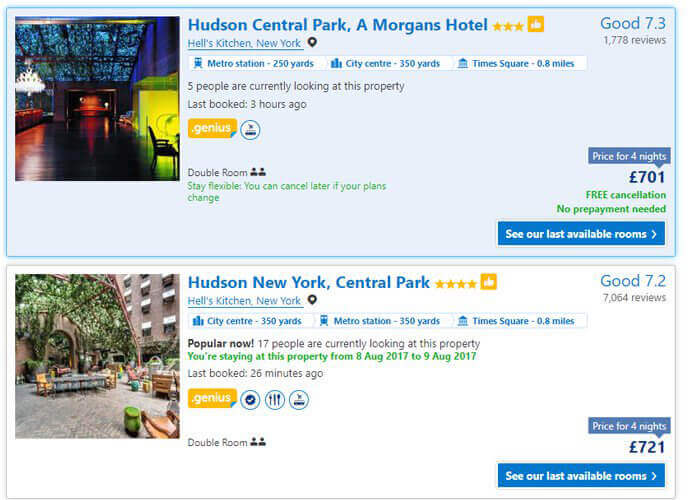
An August 4 article in the popular UK site MoneySavingExpert.com revealed that Booking.com recently ran an experiment with Morgans Hotel Group to see how star ratings impact bookings.
During the test, Booking.com advertised the Hudson Hotel in New York as both a three-star and four-star property under slightly different names. (Note that star ratings for hotels around the world are accredited under varying systems, with the U.S. star ratings being much more flexible than its U.K. counterparts.)
The test for Hudson Hotel had the four-star listing offered at a slightly higher nightly rate at £5 more per night:

Unfortunately, Booking.com got caught running the experiment after a customer noticed the double listing at the two different prices. The Hudson Hotel was quick to point out the price disparity was a mistake, and that it only ran the experiment to compare different star ratings.
In a statement, Booking.com referred to the trial as “a one-off for one hotel only” and confirmed that the hotel is now only listing the four-star option.
However, this example clearly indicates a willingness for OTAs to offer a testing ground for hotels. Based on that prospect, what kind of benefits might such an opportunity present?
The benefits of A/B testing
For e-commerce sites, the value of carrying out ongoing tests on a website can’t be overstated. In the case of Booking.com, they never make a single adjustment to their website without validating it first. This attention to detail is a big reason for their continued success in the battle for direct bookings.
Commonly referred to as A/B testing, this comparative process involves changing just one element of a website at a time to see which change yields the most effective results.
While A/B tests can be conducted independently, not all hotels have the resources to do so. In the case of the Hudson Hotel, they simply instructed Booking.com to carry out the work on their behalf. This alleviated the burden of them having to deal with a technical and time-consuming process.




